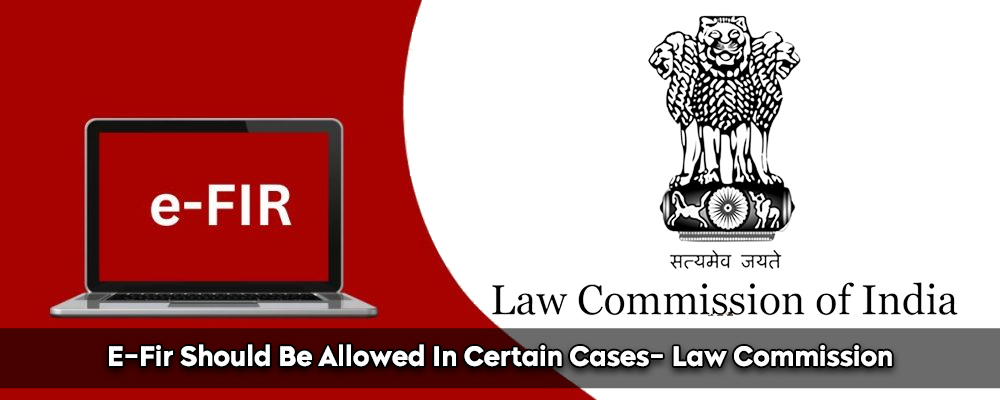The Law Commission of India has recommended in its 282nd report, that for all cognizable offences punishable for a period of maximum 3 years, could be registered through electronic FIRs when the identity of the accused is known. The recommendation was given for acts related to the CrPC, Evidence Act, Information Technology Act, 2000, IPC, and other legislations.
Need A Legal Advice
The internet is not a lawyer and neither are you. Talk to a real lawyer about your legal issue

Headed by Retd. Karnataka High Court Judge Ritu Raj Awasthi, the commission, for the amendment in Section 154 of the CrPC related to the online registration of the FIR, recommended that-
- In cases where the identity of the accused is not known, e-FIR should be registered for all cognizable offences as per Section 154 of the Code of Criminal Procedure, 1973.
- In cases, where the identity of the accused is known, it was recommended that an e-FIR should be registered for cognizable offences punishable for three years max.
- It was pointed out that such limited registration of e-FIR for the time being would help ensure that no disruption is there for procedures related to the report and investigation of serious offences.
E-FIR not in every case
- The Commission highlighted the fact in the report that the e-FIR scheme would not be applied to all offences for practical reasons, such as in
matrimonial disputes,
commercial offences,
medical negligence cases,
corruption cases, and
- Such offences with abnormal delays in reporting, where preliminary inquiries were mandated by the Supreme Court.
- On the other hand, the commission also recommended that states would have further power to expand this list of offences and would be eligible for e-FIR registration, in case the system proves effective.
Referring to the Supreme Court’s landmark judgement in the case of Lalita Kumari v. State of Uttar Pradesh, it was held by the top court that preliminary enquiry would be conducted in cases pertaining to matrimonial disputes, commercial offences, medical negligence and corruption and many others.
282nd Report of the Law Commission of India
- This report is an outcome of the comprehensive consultation process which began in July 2018, after the Prime Minister Narendra Modi’s address at the BSF Academy, Tekanpur, after which the Ministry of Home Affairs had written to the commission to consider the option of enabling the online registration of FIRs by amending Section 154 of the Criminal Procedure Code.
- As a result, the previous law commission wrote to the chief justices of all high courts of the States, to seek opinions from judicial officers under their jurisdiction regarding the same.
- As per the result the replies from the High Courts were overwhelmingly in the favour of amending Section 154 to allow for e-FIRs. A session with the police officers from various states was also held in August 2018, which was considered by the commission as well.
- On the basis of these consultations with the experts on the subject-matter as well as a thorough analysis of the legal framework governing the registration of FIRs, which also included the recommendations of other commissions and committees as well, the Law Commission of India concluded that allowing all citizens an ‘unhindered and equal access’ to the criminal justice system, which is initiated with registration of an FIR, is a necessary component of the right to equality provided under Article 14 of the Constitution, hence the recommendation.
- For matters related to non-cognizable offences, the Commission recommended that registration of e-complaint should be allowed.
For matters related to the filing of cognizable offences, or any other advice on criminal matters as well as any other legal matter such as a divorce issue, cases related to family property, etc, you may contact us Lead India in case you wish to talk to a lawyer or seek free legal advice or wish to talk to a lawyer, as we offer you a team of experienced advocates who have been successfully dealing with cases related to civil as well as criminal law.





 Talk to a Lawyer
Talk to a Lawyer